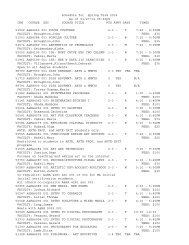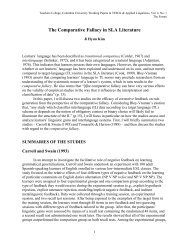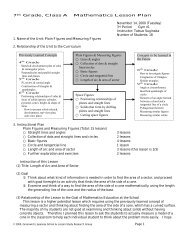UNICEF Mongolia - Teachers College Columbia University
UNICEF Mongolia - Teachers College Columbia University
UNICEF Mongolia - Teachers College Columbia University
Create successful ePaper yourself
Turn your PDF publications into a flip-book with our unique Google optimized e-Paper software.
CHAPTER 5: TOTAL PAY OF TEACHERS AND THE BONUS SYSTEM<br />
• MECS Ministerial Order #74, November 13, 2008, “On Approving the Procedure for Issuing<br />
and Revoking Teacher’s License”<br />
o The Order outlines the work of the “Teacher-Licensing Commiee” and explains the<br />
procedure for those teachers who apply for a new teacher’s license (including those<br />
who have changed their specializaon) as well as those whose license was revoked and<br />
request to be reinstated. The license may be revoked for a variety of reasons, listed in<br />
the MECS Order #74. It may also be revoked based on the recommendaon of the local<br />
“Ethics Council” (see secon 3.1.2).<br />
• MECS Ministerial Order #41, February 12, 2007, “Ethics Rule of General Educaon School and<br />
Kindergarten <strong>Teachers</strong>”<br />
o The Order presents the ethical norms of teachers and lays out the sancons in case of<br />
non-compliance with the norms. In addion, the role of the newly established Ethics<br />
Councils is described.<br />
These three orders together have changed the work condions in schools considerably. Contrary to<br />
before, it is now possible to revoke a teaching license and terminate the employment of a teacher.<br />
Outcomes-contracts are oen used to document the below-standard performance of a teacher. From<br />
the perspecve of the <strong>Teachers</strong> Union of <strong>Mongolia</strong>, the outcomes-contracts in effect transformed the<br />
teaching profession in <strong>Mongolia</strong> into a one-year term-appointment that, assuming good performance, is<br />
renewed every year. In other words, the outcomes-contract has made teachers vulnerable and subject<br />
to annual evaluaon by educaon managers and, in the case of conflict, higher levels of administraon.<br />
Such a contract is typically very broad and deals with all kinds of performance areas concerning a teacher,<br />
ranging from genuinely pedagogical tasks (improving outcome of students, preparing lessons, etc.) to<br />
tasks that have lile impact on teaching quality (e.g., subming reports in me, communicaon skills<br />
and appearance of teacher, etc.). The revocaon of licenses more oen than not leads to legal bales,<br />
and in the end, the only licenses revoked have been of those teachers who, due to geographic distance,<br />
did not have access to help from lawyers of the <strong>Teachers</strong> Union.<br />
In two of the schools from the <strong>UNICEF</strong> sample, all of the teachers received the same percentage of their<br />
salary for the annual outcomes-based supplement (30 percent), while in all other schools, the payment<br />
varied from 10–50 percent of the monthly salary. There seems to be no limitaon for the outcomesbased<br />
bonus, in pracce. This bonus is clearly subject to the educaonal fund that the school managed<br />
to accumulate from savings or from addional income. Thus, resource-rich schools are able to provide<br />
higher awards for the outcomes-contracts than smaller schools that, due to the higher per capita cost, are<br />
not able to save from the entled variable part of the budget (salary fund) or simply have few addional<br />
sources of income.<br />
5.2.3. Bonus for Skills-Based Quarterly Performance<br />
This parcular bonus (A, B, C Bonus) is part of the salary fund and is centrally allocated to schools; this<br />
is spelled out in the Government Order #54 of December 10, 2008, “On According Pecuniary Incenves<br />
Based on Quarterly Work Results.” 41 The Order specifies the criteria for each group of employees in<br />
the school: teachers, educaon managers, principals, school social workers, school dormitory teachers,<br />
school librarians, school doctors, as well as accountants, treasurers, cooks, plumbers, electricians,<br />
1<br />
2<br />
3<br />
4<br />
5<br />
6<br />
TEACHERS IN MONGOLIA: AN EMPIRICAL STUDY ON RECRUITMENT INTO TEACHING,<br />
PROFESSIONAL DEVELOPMENT, AND RETENTION OF TEACHERS<br />
83<br />
41 Signed by the Prime Minister, Minister of Educaon, Culture and Science, and Minister of Finance.




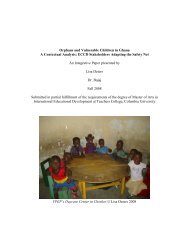
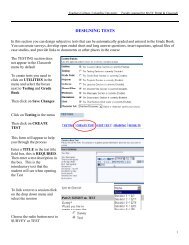
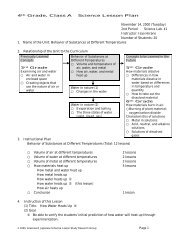

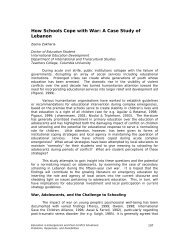
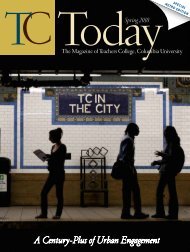
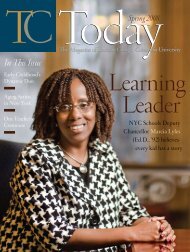


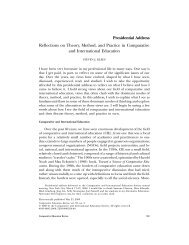
![TC Tod[...].pdf - Teachers College Columbia University](https://img.yumpu.com/27074883/1/190x252/tc-todpdf-teachers-college-columbia-university.jpg?quality=85)
